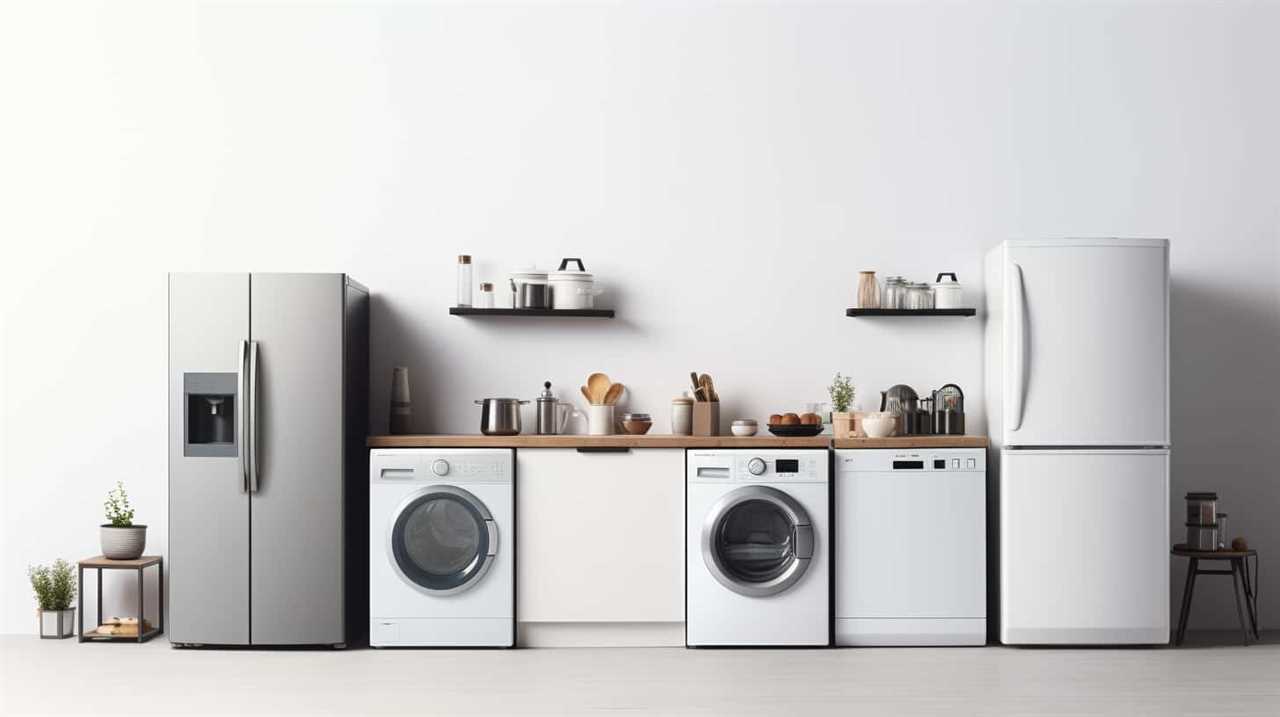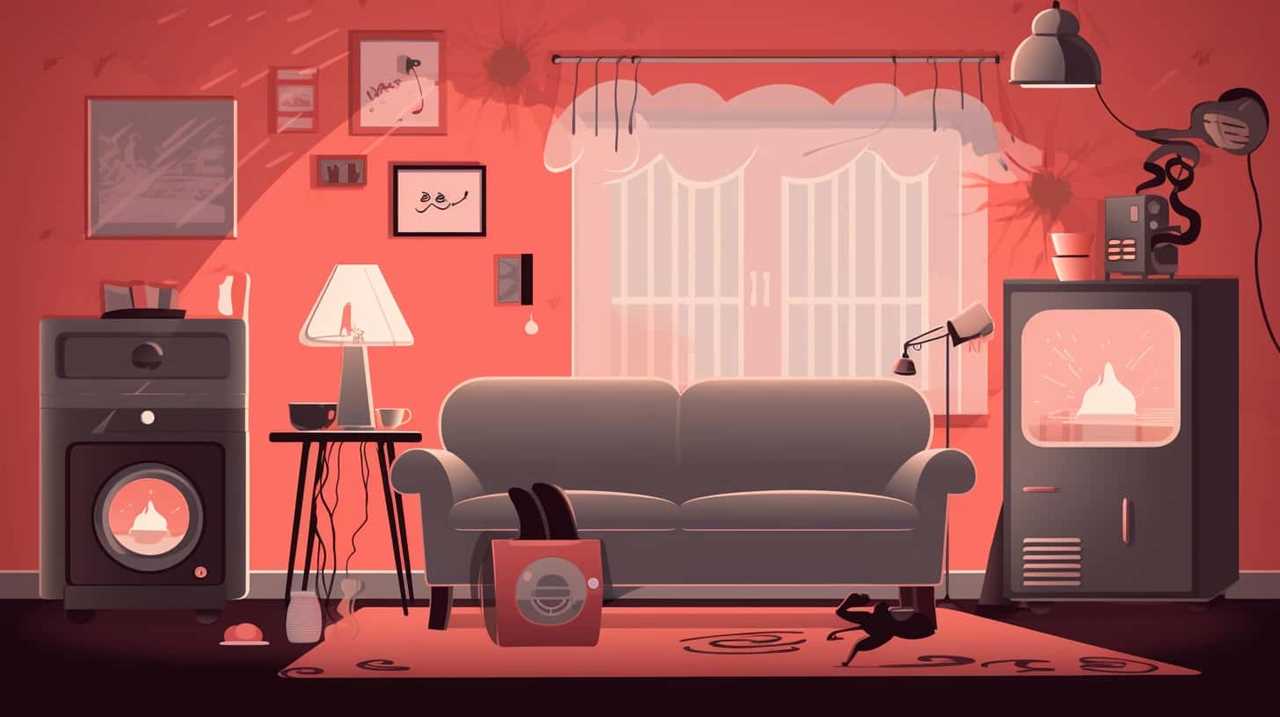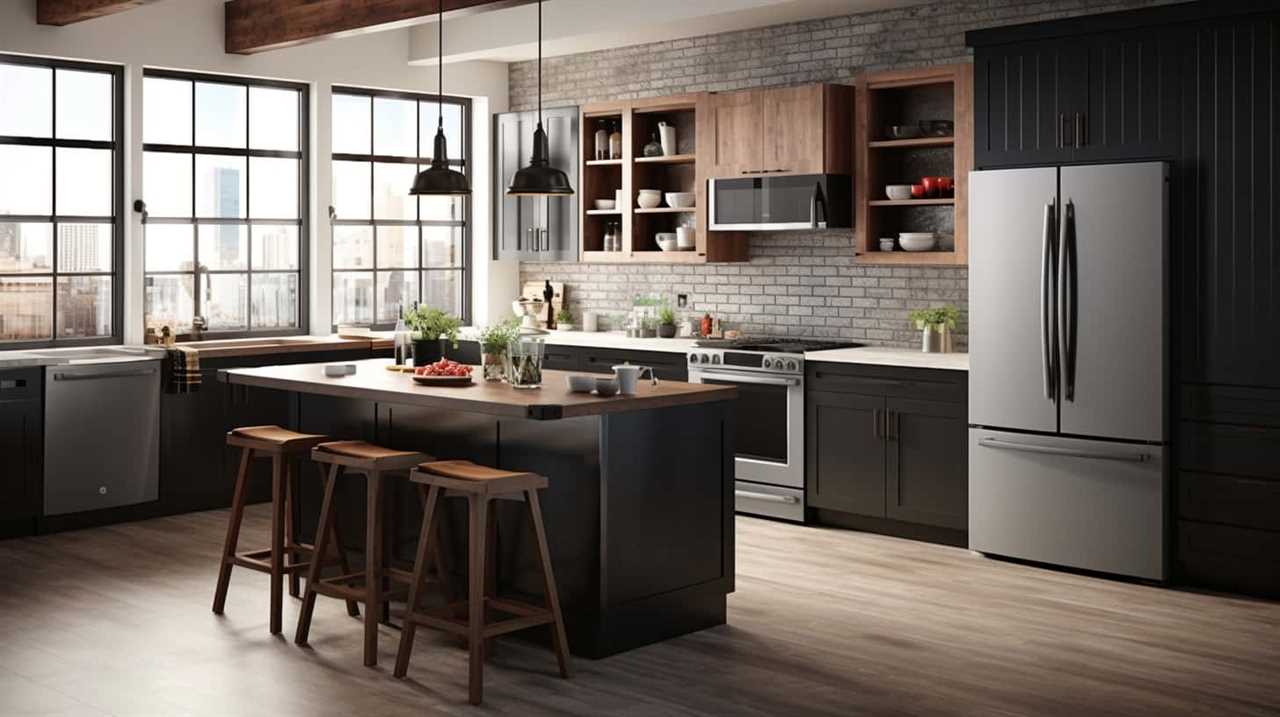At some stage, we have all pondered: Is it okay to throw our small appliances in the garbage?
In this article, we’ll delve into the environmental impact of improper disposal, the potential hazards that come with it, and the legal regulations surrounding appliance disposal.
We’ll also explore recycling options and donation programs, as well as provide guidance on how to properly prepare appliances for disposal.
Let’s make conscious choices and ensure responsible disposal of our unwanted appliances.

Key Takeaways
- Small appliances contain hazardous materials that can contaminate soil, groundwater, and water sources if improperly disposed of.
- Proper disposal methods such as recycling can reduce environmental pollution and minimize health risks associated with small appliances.
- Understanding and complying with legal regulations is essential to avoid legal consequences related to appliance disposal.
- Recycling and donation programs provide environmentally-friendly alternatives to throwing small appliances in the trash, reducing waste and supporting a healthier and more sustainable environment.
Environmental Impact of Throwing Small Appliances
We need to consider the significant environmental impact of throwing small appliances in the trash. Improper disposal of small appliances can lead to potential health risks and harm the environment. Many of these appliances contain hazardous materials such as lead, mercury, and other toxic substances. When these appliances end up in landfills, these harmful substances can leach into the soil and contaminate water sources, posing a threat to human health and wildlife.
Furthermore, the production of small appliances contributes to greenhouse gas emissions and the depletion of natural resources. Therefore, it’s crucial to adopt proper disposal methods for small appliances, such as recycling or donating them to organizations that can repurpose or refurbish them. By doing so, we can reduce environmental pollution and minimize the potential health risks associated with improper disposal.
Potential Hazards of Improper Disposal
Improper disposal of small appliances can have significant environmental impacts and pose serious health risks. When these appliances end up in landfills, they can release harmful chemicals and pollutants into the soil and groundwater, leading to contamination.
Additionally, some small appliances contain hazardous materials like lead, mercury, or arsenic, which can be harmful if not disposed of properly.

It’s crucial to understand the potential hazards associated with improper disposal and take the necessary steps to ensure safe and responsible handling of small appliances.
Environmental Impact of Disposal
Disposing of small appliances improperly can have detrimental environmental consequences. Here are four potential hazards of improper disposal:
- Soil contamination: Many small appliances contain hazardous substances such as heavy metals and chemicals. When these appliances are thrown in the trash, these harmful substances can leach into the soil, polluting it and posing a risk to plant and animal life.
- Water pollution: Improperly disposed of small appliances can end up in landfills, where they can release toxins that seep into groundwater or nearby bodies of water. This pollution can harm aquatic ecosystems and contaminate drinking water sources.
- Air pollution: Some small appliances, like old air conditioners or refrigerators, contain refrigerants and other chemicals that contribute to ozone depletion and greenhouse gas emissions. When these appliances aren’t disposed of properly, these harmful substances can be released into the air, contributing to air pollution and climate change.
- Waste accumulation: Improper disposal of small appliances leads to unnecessary waste accumulation in landfills. This not only takes up valuable space but also contributes to the depletion of natural resources and the emission of greenhouse gases during the decomposition process.
It is crucial to dispose of small appliances responsibly to minimize these potential environmental hazards.
Health Risks Involved
Continuing the discussion from the previous subtopic on the environmental impact of improper disposal, we need to address the potential health risks involved. Improperly disposing of small appliances can lead to a range of health hazards due to the toxic materials present in these devices. When thrown in the trash, these appliances can release harmful substances into the environment, posing risks to both humans and wildlife. To ensure the safe disposal of small appliances, it is essential to follow proper disposal methods. This involves recycling them at designated facilities or participating in electronic waste collection programs. By doing so, we can minimize the health risks associated with the improper disposal of small appliances.

| Health Risks | Proper Disposal Methods |
|---|---|
| Exposure to hazardous materials such as lead, mercury, and cadmium | Recycle at designated facilities |
| Air and water pollution | Participate in electronic waste collection programs |
| Contamination of soil and groundwater | Donate or sell still functioning appliances |
Legal Regulations on Appliance Disposal
When it comes to disposing of small appliances, it’s important to be aware of the legal regulations in place. Proper appliance disposal isn’t only necessary to protect the environment from the harmful effects of improper disposal, but it can also prevent potential legal consequences.
Understanding the legal requirements surrounding appliance disposal can help ensure that we’re doing our part in keeping our communities clean and safe.
Proper Appliance Disposal
One of the most important aspects of proper appliance disposal is ensuring that we comply with legal regulations. To responsibly dispose of appliances, it’s crucial to consider recycling options and follow the guidelines set by local authorities.
Here are four key points to keep in mind:

- Check local regulations: Different areas may have specific rules regarding the disposal of appliances. Research local laws or contact the waste management department to understand the requirements.
- Use recycling programs: Many communities offer recycling programs for appliances. These programs ensure that appliances are properly handled, disassembled, and recycled in an environmentally friendly manner.
- Donate or sell working appliances: If your appliance is still in good condition, consider donating it to a charitable organization or selling it to someone in need. This helps reduce waste and extends the lifespan of the appliance.
- Hire professional disposal services: In some cases, specialized disposal services may be required, especially for appliances containing hazardous materials. These professionals can safely handle and dispose of the appliance according to regulations.
Environmental Impact of Disposal
To understand the environmental impact of appliance disposal and the legal regulations surrounding it, we must consider the potential harm caused by improper disposal methods. Improper disposal of small appliances can have significant consequences for both the environment and human health. These appliances often contain hazardous materials such as lead, mercury, and cadmium, which can leach into the soil and contaminate groundwater if not disposed of properly.
This contamination can have long-term effects on ecosystems and pose potential health risks to humans and wildlife. To mitigate these risks, it’s crucial to follow proper disposal methods for small appliances.
Many countries and regions have specific regulations in place to ensure the safe disposal of these items, including designated collection points, recycling programs, and restrictions on landfill disposal. By adhering to these regulations, we can minimize the environmental impact of appliance disposal and protect our health and the planet.
Legal Consequences of Improper Disposal
While throwing small appliances in the trash may seem like a convenient option, it’s important to be aware of the legal consequences of improper disposal. Improperly disposing of small appliances can lead to significant health risks and is often against the law. Here are four key legal regulations to consider:

- Environmental Protection Laws: Many countries have strict regulations in place to protect the environment from hazardous waste. Small appliances contain materials that can be harmful if not handled properly.
- Waste Management Guidelines: Local municipalities often have specific guidelines for disposing of electronic waste, including small appliances. Failure to follow these guidelines can result in fines or other penalties.
- Recycling Laws: Some jurisdictions require the recycling of certain types of electronic waste, including small appliances. Disposing of these items in the trash can lead to legal consequences.
- Producer Responsibility Laws: In some areas, manufacturers are responsible for the proper disposal of their products. This means that improper disposal of small appliances could result in legal action against the manufacturer.
Understanding and complying with these legal regulations is essential to avoid any legal consequences.
Transitioning to the next section, let’s explore the recycling options for small appliances.
Recycling Options for Small Appliances
We frequently recycle our small appliances to ensure they’re properly disposed of. There are various recycling options and donation programs available for small appliances.
Many cities have recycling centers or drop-off locations specifically for electronic waste, where you can bring your small appliances for recycling. These centers often accept items such as toasters, blenders, and coffee makers.

Additionally, some electronics retailers offer recycling programs where you can bring your small appliances for proper disposal.
Another option is to donate your small appliances to charitable organizations or thrift stores that accept used appliances in good working condition. These organizations may refurbish the appliances or sell them to support their programs.
It’s important to research local recycling options and donation programs to find the most suitable method for disposing of your small appliances responsibly.
Donation Programs for Unwanted Appliances
Donating unwanted appliances is a great alternative to throwing them in the trash. There are various recycling options available, including donation programs, that allow us to give our appliances a second life.

Recycling Options Available
There are numerous options available for recycling unwanted appliances, including donation programs that accept small appliances. Recycling not only benefits the environment by reducing waste and conserving resources, but it also promotes responsible disposal methods.
When it comes to small appliances, here are four donation programs that you can consider:
- Goodwill: Goodwill accepts small appliances in good working condition and sells them in their stores to support job training programs.
- The Salvation Army: The Salvation Army accepts small appliances and resells them in their thrift stores to fund their programs and services.
- Habitat for Humanity ReStore: Habitat for Humanity ReStore accepts small appliances and sells them to support their mission of building affordable housing.
- Local charitable organizations: Many local charitable organizations have donation programs that accept small appliances. Check with your local community center or church to find out more.
Benefits of Donating
Continuing the discussion on recycling options available, let’s explore the benefits of donating small appliances to charity programs. Donating unwanted appliances not only helps the environment by reducing waste but also has several other advantages. Firstly, it allows you to declutter your home and make space for new items. Secondly, donating appliances to local donation centers supports community organizations and helps those in need. Lastly, it can provide you with a tax deduction, as donations to registered charities are often tax-deductible. To illustrate the benefits of donation programs, here is a table highlighting some local donation centers and the types of appliances they accept:
| Donation Center | Accepted Appliances |
|---|---|
| Goodwill | Small kitchen appliances |
| Salvation Army | Microwaves, blenders, etc. |
| Habitat for Humanity | Refrigerators, stoves, etc. |
| Local Food Banks | Coffee makers, toasters, etc. |
Local Donation Centers
To further explore recycling options for unwanted appliances, let’s now delve into local donation centers and their programs for accepting these items.

Local donation centers provide a convenient and responsible way to get rid of your unwanted appliances while also benefiting others in need. Here are some key points to consider:
- Local pickup: Many donation centers offer the convenience of picking up your unwanted appliances directly from your home. This saves you the hassle of transporting them yourself.
- Tax deductions: When you donate appliances to a registered nonprofit donation center, you may be eligible for a tax deduction. Be sure to ask for a receipt to document your donation.
- Supporting the community: By donating your unwanted appliances, you’re helping local charities and organizations provide essential services to those in need.
- Environmental impact: Donating appliances reduces waste and promotes the reuse of resources, contributing to a healthier and more sustainable environment.
Consider contacting your local donation center to find out more about their specific donation programs and how you can participate in giving back to your community.
Reselling or Trading Options for Used Appliances
We have several options for reselling or trading our used appliances.
One option is to sell them through online marketplaces such as eBay or Craigslist. These platforms allow us to reach a wide audience and potentially get a higher price for our appliances.

Another option is to trade our appliances at local secondhand stores or consignment shops. These establishments often accept used appliances in good condition and offer store credit or cash in exchange.
Additionally, some manufacturers or retailers have buyback programs where they purchase used appliances from customers. These programs can be a convenient way to dispose of our appliances while also getting some money back.
Now, let’s move on to the next section where we’ll discuss the local waste management guidelines for small appliances.
Local Waste Management Guidelines for Small Appliances
Moving forward, let’s delve into how local waste management handles the disposal of small appliances. Here are some guidelines to keep in mind:

- Recycling options: Many local waste management facilities offer recycling programs for small appliances. These programs ensure that valuable materials are properly recovered and reused, reducing environmental impact.
- Donation programs: Some communities have donation programs where you can give your working small appliances to those in need. These programs help extend the life of the appliances and benefit individuals or families who may not be able to afford new ones.
- Collection events: Some municipalities organize special collection events for small appliances. These events provide a convenient and responsible way to dispose of your appliances, ensuring they’re properly handled and recycled.
- Disposal restrictions: It’s important to note that throwing small appliances in the regular trash may be prohibited in certain areas. Check with your local waste management authority to understand the specific regulations in your locality.
How to Properly Prepare Appliances for Disposal
Now let’s talk about how we can properly prepare our appliances for disposal.
It’s important to consider the recycling benefits and use proper disposal methods to minimize the environmental impact.
When getting ready to dispose of an appliance, the first step is to unplug it from the power source.
Next, remove any batteries and detachable parts, such as cords or attachments. These can be recycled separately.

Clean the appliance thoroughly and remove any remaining food or debris.
Check with your local waste management guidelines to determine if there are specific instructions for disposal. Some appliances can be donated or recycled through special programs.
Lastly, make sure to securely package the appliance to prevent any damage during transportation.
Now, let’s move on to the next section where we’ll discuss disassembling appliances for recycling purposes.

Disassembling Appliances for Recycling Purposes
To properly recycle small appliances, it’s necessary to disassemble them before disposal. Disassembling appliances not only allows for easier recycling but also maximizes the recovery of valuable materials. Here are four disassembling techniques and the recycling benefits they provide:
- Remove screws and fasteners: By unscrewing and removing fasteners, you can separate different parts of the appliance, such as the casing, cords, and internal components. This makes it easier to recycle each component separately, increasing the overall recycling efficiency.
- Disconnect wires and cables: Separating wires and cables from the appliance allows for better recycling of copper and other valuable metals. Recycling these materials reduces the need for mining and conserves natural resources.
- Remove batteries: Appliances often contain batteries, which can be recycled separately. Properly disposing of batteries prevents hazardous materials from entering landfills and allows for the recovery of valuable metals.
- Separate plastic components: Some appliances have plastic parts that can be recycled separately. Recycling plastic reduces the demand for new plastic production, conserves energy, and decreases pollution.
Responsible Disposal Methods for Hazardous Appliances
Continuing the discussion on responsible disposal methods for hazardous appliances, we must prioritize the safe and environmentally-friendly handling of these potentially harmful devices. Improper disposal of hazardous appliances can have severe environmental impacts and pose serious health risks. To ensure the proper disposal of these appliances, it is important to follow local regulations and guidelines. Many communities have designated drop-off locations or recycling centers where hazardous appliances can be safely disposed of. These facilities have the necessary expertise and equipment to handle and recycle the hazardous components of appliances. Here is a table outlining some common hazardous appliances and their potential environmental impact and health risks:
| Appliance | Environmental Impact | Health Risks |
|---|---|---|
| Refrigerators | Ozone depletion | Release of harmful refrigerants and foam blowing agents |
| Air conditioners | Ozone depletion | Release of harmful refrigerants and foam blowing agents |
| CRT televisions | Heavy metal pollution | Lead and other toxic substances in cathode ray tubes |
| Microwaves | E-waste pollution | Release of toxic chemicals and heavy metals |
| Batteries | Soil and water pollution | Leaching of toxic substances such as lead and mercury |
| Fluorescent bulbs | Mercury pollution | Release of toxic mercury vapors when broken or discarded |
Conclusion: Making Conscious Choices for Appliance Disposal
As we wrap up our discussion on responsible disposal methods for hazardous appliances, let’s emphasize the importance of making conscious choices for appliance disposal. To ensure we’re acting responsibly and ethically, there are several key considerations to keep in mind:
- Donation options: Instead of throwing away small appliances that are still in good working condition, consider donating them to local charities, shelters, or thrift stores. This not only reduces waste but also helps someone in need.
- Legal implications: Improper disposal of certain appliances can have legal consequences. Some appliances, such as refrigerators and air conditioners, contain hazardous materials that must be handled and disposed of properly to comply with environmental regulations. Be aware of local laws and regulations to avoid any legal issues.
- Recycling programs: Many communities have recycling programs specifically designed for small appliances. Look for recycling centers or drop-off locations that can properly recycle your appliances, ensuring that valuable materials are recovered and reused.
- Manufacturer programs: Some appliance manufacturers offer take-back or recycling programs for their products. Check with the manufacturer to see if they’ve any options for proper disposal or recycling of their appliances.
Frequently Asked Questions
Are There Any Health Risks Associated With Throwing Small Appliances in the Trash?
Throwing small appliances in the trash can pose health hazards and have negative environmental impacts. We should dispose of them properly through recycling programs to prevent toxic substances from contaminating our surroundings.

What Are the Penalties for Illegally Disposing of Small Appliances?
Throwing small appliances in the trash can result in penalties and health risks. It is important to dispose of them properly to avoid fines and protect the environment.
Can Small Appliances Be Recycled if They Are Not in Working Condition?
When small appliances are not in working condition, they can still be recycled. It’s important to explore recycling options to minimize the environmental impact of disposing of these items.
Are There Any Tax Benefits for Donating Unwanted Appliances?
Yes, there can be tax deductions for donating unwanted appliances. It not only benefits us financially, but also has a positive environmental impact by promoting recycling and reducing waste.
Are There Any Specific Guidelines for Disposing of Small Appliances in My Local Area?
Local regulations may provide specific guidelines for proper disposal methods of small appliances. It’s important to follow these guidelines to ensure environmentally responsible disposal and to avoid any potential penalties or harm to the ecosystem.

Conclusion
In conclusion, when it comes to disposing of small appliances, it’s important to make conscious choices. By properly preparing appliances for disposal, disassembling them for recycling purposes, or utilizing donation programs, we can reduce the environmental impact and potential hazards.
It’s crucial to follow legal regulations on appliance disposal and opt for responsible methods, such as recycling, to minimize waste.
Let’s make a difference by taking small steps towards a greener future.










